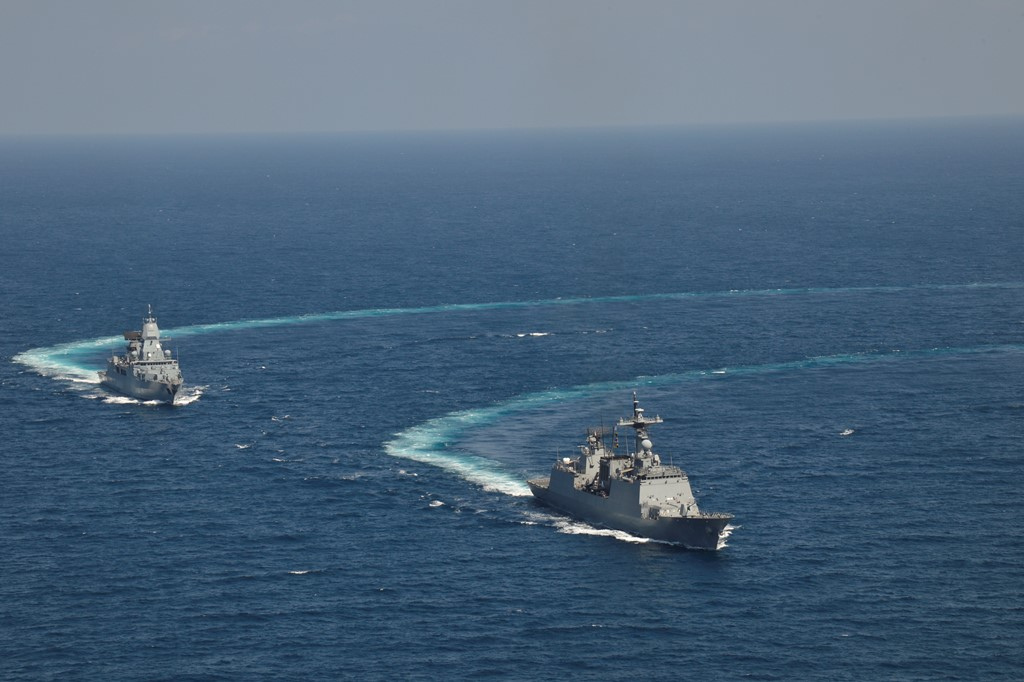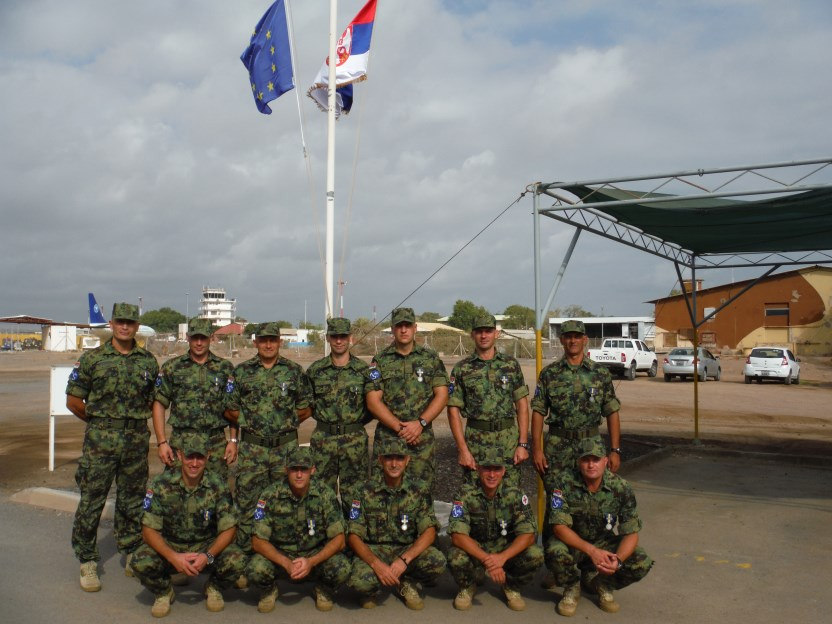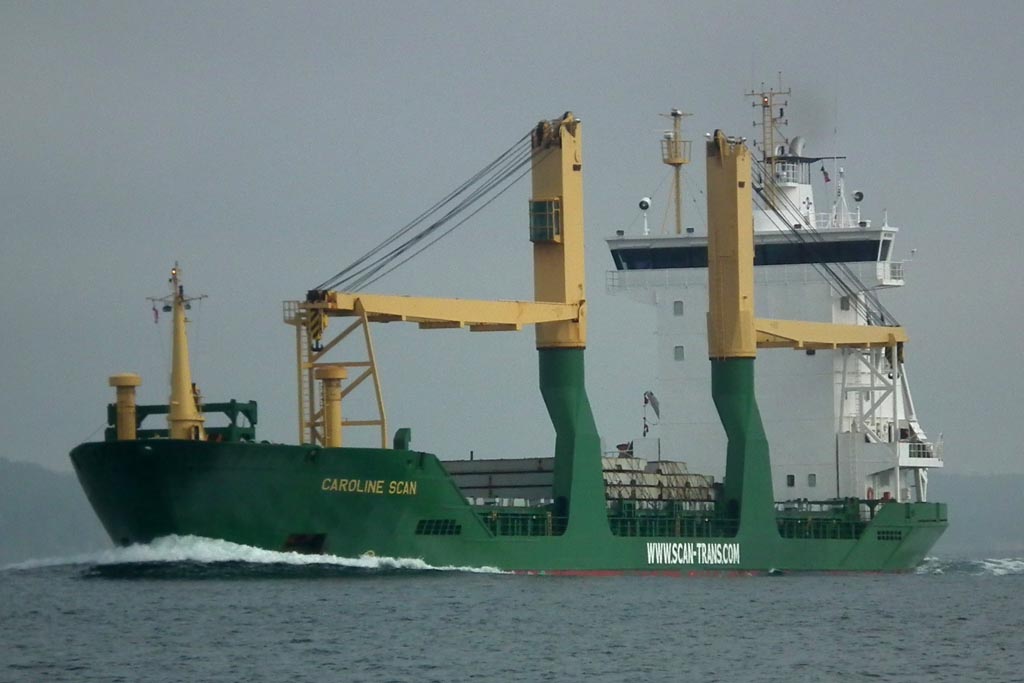- About MoD
Minister and Associates
- Minister
- State Secretary
- Assistant Ministers
- Secretary of the Ministry of Defence
Sectors
- Defence Policy Sector
- Human Resources Sector
- Material Resources Sector
- Budget and Finanance Sector
- Sector for Infrastructure and Hospitality Services
- SAF
- Documents
- Services
- Sport
- Archive
- Contacts
Mission at the Equator
 By Major Ivan Tanackovic, Commanding Officer of Serbian AVPD
By Major Ivan Tanackovic, Commanding Officer of Serbian AVPDThe main task of the first Serbian team sent to combat piracy, as an Autonomous Vessel Protection Detachment (AVPD) in Operation Atalanta (EU NAVFOR Somalia – Operation Atalanta), was to continually provide security for the merchant vessel "Caroline Scan" carrying humanitarian aid as part of the World Food Programme (WFP) to Somalia ports.
AVPD is tasked to continuously secure ship from possible pirate attacks both at sea and in ports, conduct continuous inspections and control of the ship during the sail, especially in ports, where special emphasis is given to control of persons who, for some reason, feel the need to be on board or nearby. This means that the AVPD is engaged 24/7 in shifts of three or four hours, and the number of people per shift varies from the security assessment for a particular region.
Ocean at a Glance
 A typical day on board assumes certain number of working hours, day and night, during the shipping, monitoring the activities of other vessels on radars and in telecommunications, carrying out surveillance of the environment around the ship and, in ports, performing the inspection of the ship and control of persons who come aboard.
A typical day on board assumes certain number of working hours, day and night, during the shipping, monitoring the activities of other vessels on radars and in telecommunications, carrying out surveillance of the environment around the ship and, in ports, performing the inspection of the ship and control of persons who come aboard.Such engagement definitely requires a break, and certain forms of training are conducted and physical fitness is maintained in a makeshift gym. Those who are more strenuous use the deck as a jogging trail.
What is favourable is also a good contact we had with the Peacekeeping Operations Centre in Belgrade through satellite communications and for contact with their families, SIM cards for the countries in which we stay are provided.
We started our journey and protection of the "Caroline Scan" by boarding in Djibouti, on 1st December last year, where the ship carrying humanitarian aid set off on its usual route to the ports of Somalia – Berbera, Bosaso, Mogadishu, and then continued to Mombasa port in Kenya, where the loading of humanitarian aid was done again. From there, the ship goes in the reverse direction to the ports of Somalia to Djibouti and then the route repeats itself. The length of the one-way route Djibouti-Mombasa is 1735 nautical miles, which is more than 3200 kilometres.
"Carolinе Scan"
Accommodation on board of MV “Caroline scan” is versatile, from the makeshift cabins to the container mounted on the deck, but the aim is to ensure an undisturbed rest. So it was at the beginning, but later, having in mind the difficult tasks, safety of the port of Mombasa was used and half of the team alternately went to the hotel for a break and relaxation.
"Caroline Scan" is a merchant vessel 100 meters long and 17 meters wide, of which 87 meters is the area of the bow and deck. In the rest of the ship there are accommodation facilities and common rooms for 12 crew members. Rooms are arranged in six decks (floors), of which the last, the sixth one, is the command bridge of the ship and at the first one there are the office of the ship's officer, the living room and the dining room.
 Since there are 12 more members of the protection detachment onboard, certain auxiliary facilities were refurbished for accommodation, such as the room for accommodation of the sniper team, and in the existing facilities, the members of the previous teams have improvised one more bed in each of them. Due to the increased number of people on board all activities must be carried out strictly according to the schedule, so that personnel do not interfere with each other in their daily activities. Maximum cargo of the ship can be up to 4500 tons. When laden, the boat provides quite pleasant sail, and without the load it is very easy prey to the waves and in that case all the activities on board become very difficult.
Since there are 12 more members of the protection detachment onboard, certain auxiliary facilities were refurbished for accommodation, such as the room for accommodation of the sniper team, and in the existing facilities, the members of the previous teams have improvised one more bed in each of them. Due to the increased number of people on board all activities must be carried out strictly according to the schedule, so that personnel do not interfere with each other in their daily activities. Maximum cargo of the ship can be up to 4500 tons. When laden, the boat provides quite pleasant sail, and without the load it is very easy prey to the waves and in that case all the activities on board become very difficult.The ship is armed with M- 84 machine guns on pads specially made for mounting on the ship rails, which certainly has a big impact on deterring pirates of possible planned attacks. During the mission, we had very close encounters with suspicious ships and boats, both by day and night. Especially the night encounters were very unpleasant and very risky, because these were ships and boats that were not illuminated nor they were in the registry of vessels, and they looked like the pirate ones. Due to cool-headed reaction of the AVPD members after the signal and sound warning at those encounters, there was no any adverse reaction on the other side.
As for the security the team members do not leave the port of Somalia and they are under the increased caution as they were characterized as very high-risk ports. So the meetings with the local people included mostly port workers and children who are predominant in the port of Mogadishu.
Since the beginning of this year there was a number of attacks on ships, but they were all successfully rejected, and some them involved special forces of the mission placed on board the ships in the Indian Ocean.
The first Serbian AVPD has successfully completed the task, and the next team of the Special Brigade of the Serbian Armed Forces should set off on the mission in July this year.
- About MoD
- Jurisdiction
- Organisation scheme
- Description of duties
- Minister and Associates
- Minister
- State Secretary
- Assistant Ministers
- Secretary of the Ministry of Defence
- Sectors
- Defence Policy Sector
- Human Resources Sector
- Material Resources Sector
- Budget and Finanance Sector
- Sector for Infrastructure and Hospitality Services
- Special Internal Units
- Office of the Minister of Defence
- Secretariat
- Military Attorney's Office
- Administrative Bodies within MoD
- Defence Inspectorate
- Military Intelligence Agency
- Military Security Agency
- Autonomous Departments
- Public Relations Department
- Military Healthcare Department
- Higher Education Institution
- Defence University
- Specific internal units
- Inspector General of the Services
- Internal Audit Section
- SAF
- Documents
- Services
- Sport
- Archive
- Contacts

